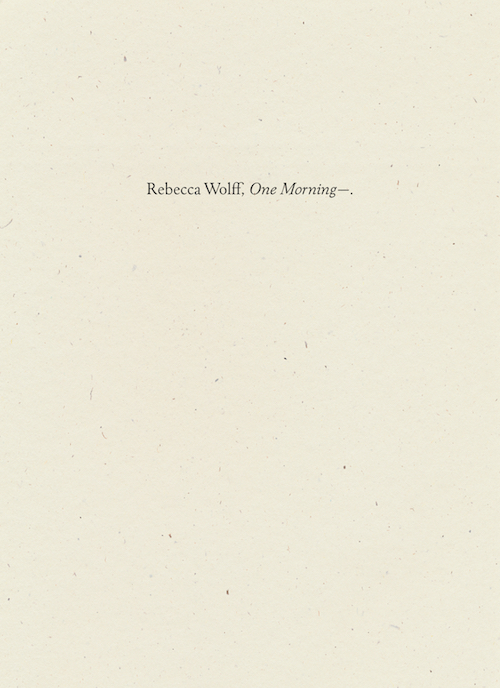'Observes herself observing': Alan Gilbert Reviews Rebecca Wolff's One Morning—

Alan Gilbert reviews Rebecca Wolff's latest collection of poetry, One Morning— (Wave Books, 2015), for Boston Review. "The book depicts a social compact in danger of being broken, whether between—as here—an I and a you, or as the more general consequence of an economic system that puts everyone in competition for resources and attention." More:
Despite this focus on looking at personal and immediate worlds, One Morning— is not particularly imagistic. Rather, Wolff observes herself observing. Similarly, each of the book’s six sections takes a different angle on her fundamental concerns. For instance, the third section is a long poem describing the life and decade-long sordid death of an allegorical family figure named Peter J. Perry who staggers through and out of hearth, wealth, health, city, country—all of it summarized as:
Between the misery of the end and the glory of beginning all the glowing love made flesh time collapses disgorging banalities. Certain are goldmines certain are minefieldsIn these lines, the ecstatic is collapsed into the mundane, while both are circumscribed by a fatalistic movement between reward and trepidation, especially within the family unit. In a prose poem entitled “The Ungovernable,” Wolff writes: “Objectively we could expect that our family members would go out of their way to behave toward us with extra care, concern, and with love.” Yet who is more “ungovernable”—the parent who withholds love or the child who in turn rebels?
This question of governability becomes a central issue relating to the individual, the family, and larger social formations. As the publisher of Fence Books (and founding editor of its accompanying literary journal), Wolff has championed audacious writing by poets such as Ariana Reines, Chelsey Minnis, and Joyelle McSweeney. One Morning— similarly grapples with the quality of permissiveness that features so strongly in their work.
Find the review in full at Boston Review.


